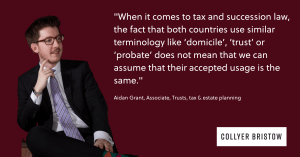- UK/USA Tax & estate planning

Shorter Reads
Inheriting from US trusts
For US/UK clients, the tools that work in the US may not necessarily be tax-efficient in the UK.
2 minute read
Published 26 January 2022
Key information
- Specialisms
- Private Wealth
- Services
- UK/USA Tax & estate planning
When considering a client’s estate planning, advisers like to reach for the most familiar tools in their arsenal. However, for US/UK clients, the tools that work in the US may not necessarily be tax-efficient in the UK. It is important therefore that any US estate plan that involves UK individuals is sensitive to UK tax rules.
Generally, there are no inherent problems with a UK person inheriting directly from a US person. Disregarding state-level US estate taxes, the current lifetime US federal gift and estate tax allowance of around $12,000,000 means significant wealth can pass without incurring US estate tax. However, just because no UK (or US) tax was paid, doesn’t mean that future tax can’t also be mitigated.
Why trusts can be beneficial
If a US person leaves assets on trust, then this can often be highly tax-efficient for
UK inheritance tax (IHT) purposes. The non-UK assets of a non-UK domiciled (and
non-deemed UK domiciled) individual (N) are outside the scope of IHT. Therefore,
gifts of non-UK assets by N during their lifetime or on their death will not incur IHT.
However, simply leaving those assets directly to a UK resident domiciliary (or
deemed UK domiciliary) (D) would then bring those assets within the IHT net,
potentially incurring an IHT charge at potentially 40 percent on D’s later death.
If, instead, N leaves those same assets on an appropriate trust for D then, managed
carefully, that trust would forever remain outside the scope of IHT, even while D and
their family were able to benefit from the assets. Ideally that trust would be left
under N’s Will and not via a US living trust for the reasons explored below.
Structured carefully, that trust may largely avoid double exposure to US and UK tax,
even if its trustees and/or beneficiaries are US and UK taxpayers by the relevant
individuals claiming a foreign tax credit wherever possible. This allows N to create a
highly tax-efficient pot from which multiple generations could benefit, forever
outside the scope of IHT.
Why trusts can be problematic
Tax issues aside, various common forms of US trust can sometimes feel alien to a
UK beneficiary. For example, UK trusts may often be fully discretionary with the
trustees having full discretion over the distribution of funds, albeit under the
guidance of the settlor. However, US trusts can often be more rigid, requiring monies
only to be distributed at certain ages, or otherwise assets might flow through a
‘waterfall’ of trusts upon the occurrence of various life events.
For UK tax purposes, UK individuals inheriting via other types of US trusts may be
additionally problematic. One such example is with US living trusts. If D inherits
assets via N’s living trust, then the precise wording of that trust is critical to whether
D pays significant UK tax on their inheritance.
It is possible for living trusts to be characterised as bare trusts for UK purposes (i.e.
akin to a mere nominee arrangement). If a D inherits assets out of a ‘bare’ living trust,
they would incur no UK tax and they would receive the assets uplifted to their date of
death open market values, exactly as if the assets were inherited directly from N.
However, living trusts are often treated as substantive settlements for UK tax
purposes. If D inherits assets out of a ‘substantive settlement’ living trust, they are
exposed to a potential UK capital gains tax (CGT) charge of up to 32 percent (at
current rates) based on: (1) any unrealised trust gains at the date of the distribution;
and (2) any realised but undistributed gains throughout the lifetime of the trust. N’s
death would very likely not cause any of the trust assets to be uplifted for CGT
purposes.
What US/UK individuals should do
If Wills and broader estate plans have already been drawn up, it is usually well worth
US individuals having that plan reviewed in the UK for a fiscal ‘health check’. With
perhaps only a few small changes it may save considerable future cost for UK
resident beneficiaries. Most of the common ways to improve US/UK tax efficiency in
an estate plan happen during the US person’s lifetime, such as sometimes amending
a living trust to make it look as much like a bare trust as possible.
However, even if the US person has died all is not necessarily lost. It may be possible
for example to execute a deed of variation of the US Will to redirect the non-UK
assets into an excluded property trust. However, this must be completed within two
years of the individual’s death, meaning that the UK family would do well to take the
appropriate UK advice promptly.
First published in EPrivate client
Related content
Shorter Reads
Inheriting from US trusts
For US/UK clients, the tools that work in the US may not necessarily be tax-efficient in the UK.
Published 26 January 2022
Associated sectors / services
Authors
When considering a client’s estate planning, advisers like to reach for the most familiar tools in their arsenal. However, for US/UK clients, the tools that work in the US may not necessarily be tax-efficient in the UK. It is important therefore that any US estate plan that involves UK individuals is sensitive to UK tax rules.
Generally, there are no inherent problems with a UK person inheriting directly from a US person. Disregarding state-level US estate taxes, the current lifetime US federal gift and estate tax allowance of around $12,000,000 means significant wealth can pass without incurring US estate tax. However, just because no UK (or US) tax was paid, doesn’t mean that future tax can’t also be mitigated.
Why trusts can be beneficial
If a US person leaves assets on trust, then this can often be highly tax-efficient for
UK inheritance tax (IHT) purposes. The non-UK assets of a non-UK domiciled (and
non-deemed UK domiciled) individual (N) are outside the scope of IHT. Therefore,
gifts of non-UK assets by N during their lifetime or on their death will not incur IHT.
However, simply leaving those assets directly to a UK resident domiciliary (or
deemed UK domiciliary) (D) would then bring those assets within the IHT net,
potentially incurring an IHT charge at potentially 40 percent on D’s later death.
If, instead, N leaves those same assets on an appropriate trust for D then, managed
carefully, that trust would forever remain outside the scope of IHT, even while D and
their family were able to benefit from the assets. Ideally that trust would be left
under N’s Will and not via a US living trust for the reasons explored below.
Structured carefully, that trust may largely avoid double exposure to US and UK tax,
even if its trustees and/or beneficiaries are US and UK taxpayers by the relevant
individuals claiming a foreign tax credit wherever possible. This allows N to create a
highly tax-efficient pot from which multiple generations could benefit, forever
outside the scope of IHT.
Why trusts can be problematic
Tax issues aside, various common forms of US trust can sometimes feel alien to a
UK beneficiary. For example, UK trusts may often be fully discretionary with the
trustees having full discretion over the distribution of funds, albeit under the
guidance of the settlor. However, US trusts can often be more rigid, requiring monies
only to be distributed at certain ages, or otherwise assets might flow through a
‘waterfall’ of trusts upon the occurrence of various life events.
For UK tax purposes, UK individuals inheriting via other types of US trusts may be
additionally problematic. One such example is with US living trusts. If D inherits
assets via N’s living trust, then the precise wording of that trust is critical to whether
D pays significant UK tax on their inheritance.
It is possible for living trusts to be characterised as bare trusts for UK purposes (i.e.
akin to a mere nominee arrangement). If a D inherits assets out of a ‘bare’ living trust,
they would incur no UK tax and they would receive the assets uplifted to their date of
death open market values, exactly as if the assets were inherited directly from N.
However, living trusts are often treated as substantive settlements for UK tax
purposes. If D inherits assets out of a ‘substantive settlement’ living trust, they are
exposed to a potential UK capital gains tax (CGT) charge of up to 32 percent (at
current rates) based on: (1) any unrealised trust gains at the date of the distribution;
and (2) any realised but undistributed gains throughout the lifetime of the trust. N’s
death would very likely not cause any of the trust assets to be uplifted for CGT
purposes.
What US/UK individuals should do
If Wills and broader estate plans have already been drawn up, it is usually well worth
US individuals having that plan reviewed in the UK for a fiscal ‘health check’. With
perhaps only a few small changes it may save considerable future cost for UK
resident beneficiaries. Most of the common ways to improve US/UK tax efficiency in
an estate plan happen during the US person’s lifetime, such as sometimes amending
a living trust to make it look as much like a bare trust as possible.
However, even if the US person has died all is not necessarily lost. It may be possible
for example to execute a deed of variation of the US Will to redirect the non-UK
assets into an excluded property trust. However, this must be completed within two
years of the individual’s death, meaning that the UK family would do well to take the
appropriate UK advice promptly.
First published in EPrivate client
Associated sectors / services
- UK/USA Tax & estate planning
Authors
Need some more information? Make an enquiry below.
Subscribe
Please add your details and your areas of interest below
Article contributor
Aidan
GrantSenior Associate
Specialising in International trusts, tax & estate planning, Private wealth, UK trusts, tax & estate planning and US/UK Tax & estate planning
Enjoy reading our articles? why not subscribe to notifications so you’ll never miss one?
Subscribe to our articlesMessage us on WhatsApp (calling not available)
Please note that Collyer Bristow provides this service during office hours for general information and enquiries only and that no legal or other professional advice will be provided over the WhatsApp platform. Please also note that if you choose to use this platform your personal data is likely to be processed outside the UK and EEA, including in the US. Appropriate legal or other professional opinion should be taken before taking or omitting to take any action in respect of any specific problem. Collyer Bristow LLP accepts no liability for any loss or damage which may arise from reliance on information provided. All information will be deleted immediately upon completion of a conversation.
Close































